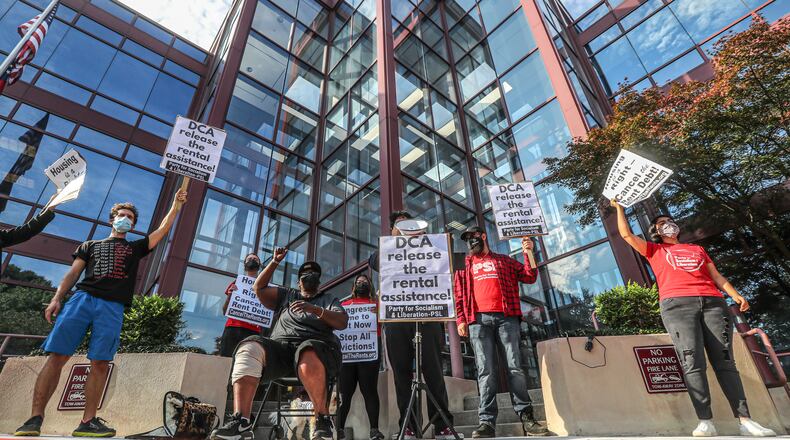The Department of Community Affairs has abruptly stopped taking applications for its rental assistance program, apparently leaving a number of tenants in the lurch.
The Department posted word on its website late last week that the pandemic-triggered efforts to help prevent disruption and homelessness were no longer accepting applications, but did not elaborate. The website said the department would keep processing those already filed.
However, at least some tenants say that they were already approved for assistance, then had that approval removed from the department’s portal, leading housing advocates and tenants to believe the program had ended.
“The DCA put some tenants in a pretty bad position,” said Lindsay Siegel, director of housing advocacy at Legal Aid of Atlanta. “If they knew they were running out of money, they should have told them so they could plan.”
The federal program, initiated in late 2020 when millions of people were still out of work due to pandemic-triggered shutdowns, was intended to prevent disruption, financial distress and homelessness.
In Georgia, a number of other agencies and municipalities have also been running rental assistance programs with the federal money. If they have not spent all the money they were given, the program can continue through next year.
The suspension of applications came as a shock to housing advocates.
“We didn’t expect the program to end anytime soon because the DCA was so far behind in making payments,” said Siegel. “We thought the program would last a long time.”
Critics were primed for bad news, said Tamara Caldas, who oversees the pro bono program at the law firm Kilpatrick Townsend. She said she led a group of attorneys who volunteered to help the DCA by working with tenants but said the department rebuffed them.
“Unlike other states, I don’t think they’ve had any interest in a program that would help build an infrastructure to help people for the long-term,” she said. “From the beginning, their position has been that Georgia never really needed this money.”
The lack of explanation for the abrupt action had been baffling, Caldas said. “If they were out of money, wouldn’t they be quick to tell you, so they could say, ‘We did a great job?’”
In a call to The Atlanta Journal-Constitution late Tuesday, Christopher Nunn, the department’s commissioner, said that concern about having enough money was indeed the reason to suspend applications.
Nunn said emphatically that the program has not ended.
“That is confusing and inaccurate,” he said. “In no way shape or form has this program been cancelled. It is irresponsible to publish an article that says that it has been cancelled.”
An earlier online story by The Atlanta Journal-Constitution referred to the program as having been abruptly ended based on the department’s website, as well as interviews with lawyers and tenants. In reporting that story, multiple messages from the AJC to the department over the course of several days were not returned.
Georgia had been approved to receive $989 million in federal funds. The state has now made payments of more than $830 million, Nunn said. “We are just projecting. We do not want to be in a position where we run out of money and have applications that we cannot pay out.”
The payments are generally made directly to landlords. Applicants must show that they suffered unemployment or other financial hardship, that they were at risk of losing their homes and that their household income was at or below 80% of their area’s median.
While the economy has recovered in the past two years and many people have gone back to work, housing remains in short supply, especially for many low-wage workers. Meanwhile, the Federal Reserve has been raising interest rates in an effort to slow the economy.
“We had been approved for $1,200 and then I went back and looked at the portal Oct. 27 and suddenly it said we were denied,” said Raneice White of Atlanta. “Our rent is due Saturday and we were kind of depending on the money.”
She and her husband, a dishwasher at a restaurant, have been living with their children in an extended-stay motel since June, she said. “We are trying to get the money, but so far, we don’t have it. We had asked for help because we had other bills to pay.”
While the economy has recovered in the past two years and many people have gone back to work, housing remains in short supply, especially for many low-wage workers. Meanwhile, the Federal Reserve has been raising interest rates in an effort to slow the economy.
About the Author
Keep Reading
The Latest
Featured


